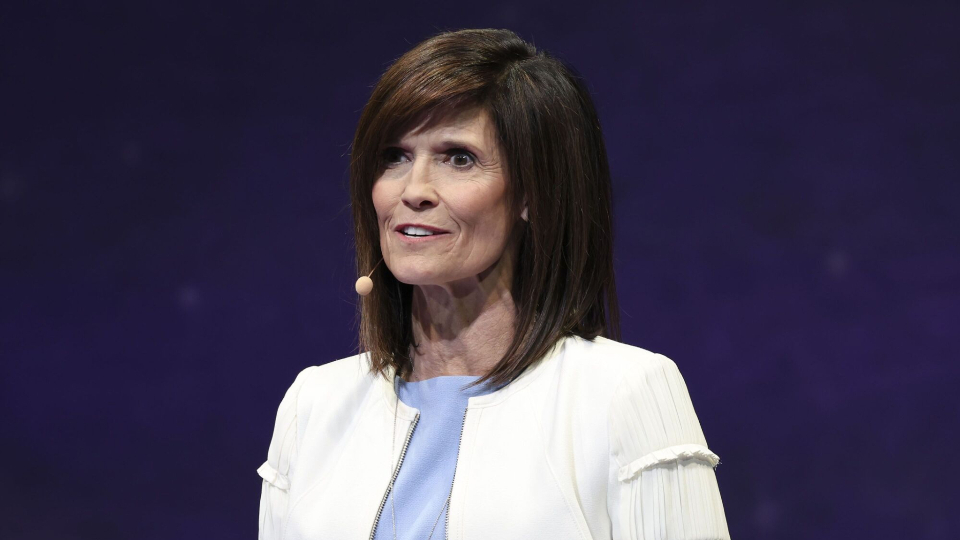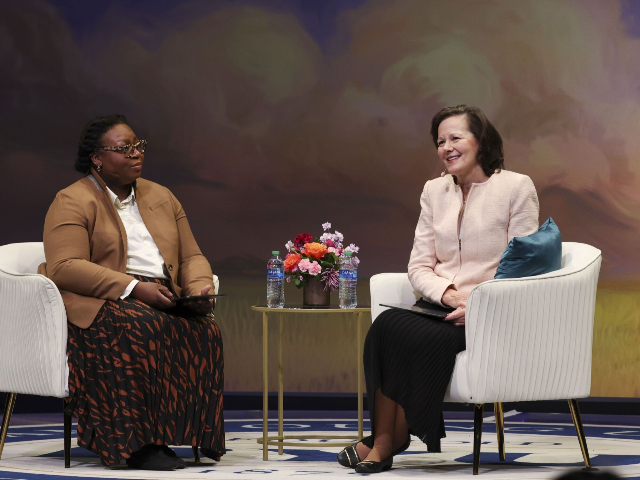
2023-BYU-Women's-Conference
Women walk on the campus of Brigham Young University in Provo, Utah during BYU Women’s Conference on Thursday, May 4, 2023. Photo by Laura Seitz, courtesy of Church News.Women walk on the campus of Brigham Young University in Provo, Utah during BYU Women’s Conference on Thursday, May 4, 2023. Photo by Laura Seitz, courtesy of Church News.
This story appears here courtesy of TheChurchNews.com. It is not for use by other media.
By Rachael Sterzer Gibson, Church News
Many Latter-day Saint women may feel overwhelmed with the demands of their circumstances, noted Sister Michelle D. Craig of the Young Women General Presidency.
Perhaps it’s too many children or not enough. Maybe it’s marital status, a Church calling or feeling underutilized. It could be financial stress or bodies, minds or relationships that need healing.
To women plagued with feelings of inadequacy or feeling that they are forever falling short, Sister Craig and Sister Rebecca L. Craven, counselors in the Young Women General Presidency, offered counsel, encouragement and testimony during a session of BYU Women’s Conference on Thursday, May 4.
Sister Craig and Sister Craven both presented in the Marriott Center on “‘Notwithstanding My Weakness’: Removing the Feeling of Forever Falling Short.”
It’s a topic “very dear to my heart,” Sister Craig said.
“The topic we’re addressing is one we believe we all relate to ― at least I do,” Sister Craven said.
The answer, they both said, lies in Jesus Christ.
“We should never question that in His mercy, the Lord is ready, willing and anxious to help us overcome our weaknesses,” Sister Craig testified.
Individuals can come to know the joy Heavenly Father has in store for them as they focus on Christ more than on their weaknesses, Sister Craven promised. “He is the source of all joy. If we are missing the joy ― His joy ― in our journey, we are missing everything.”
Lessons From the Brother of Jared
In her remarks, Sister Craig shared the story of the brother of Jared and other scriptural examples which, she said, offer her perspective “when I find myself coming up short again and again and again.”
Weakness is different than sin, Sister Craig noted.

2023-BYU-Women's-Conference
Sister Michelle D. Craig, First Counselor in the Young Women General Presidency, speaks at the BYU Women’s Conference in Provo on Thursday, May 4, 2023. Photo by Laura Seitz, courtesy of Church News.Copyright 2023 Deseret News Publishing Company.
Elder Richard G. Scott taught that “the Lord sees weaknesses differently than He does rebellion. Whereas the Lord warns that unrepented rebellion will bring punishment, when the Lord speaks of weaknesses, it is always with mercy.”
Recognizing weakness can be a catalyst to change, Sister Craig said.
In Ether 12:37, the Lord says to Moroni, “Because thou hast seen thy weakness thou shalt be made strong.”
Those who do not see their weakness do not progress, Sister Craig said. “This awareness is a blessing; it keeps us humble and turning to the Savior.”
In October 2018 general conference, Sister Craig spoke of divine discontent, which comes as individuals compare what they are to what they have the power to become. “Each of us, if we are honest, feels that gap,” Sister Craig said. “We yearn for greater personal capacity; we want to do more and be more.”
These feelings can be a blessing if they propel individuals to action and greater discipleship, she said.
“But Satan knows this as well and would have us see our weakness as a sign of failure. He would have us wallow in despair and discouragement, focusing on all that we are not — lacking in capacity, looks, finances, personality, health, talent — you name it. We all come up short in something. Our discontent can become destructive when we listen to those voices and believe the messages Satan bombards us with, or it can become divine when we turn to Jesus Christ with humility,” Sister Craig said.
In the case of the brother of Jared, he had a problem: The barges he had built had no light. But after taking it to the Lord, he went to work.
“Like the brother of Jared, we must carefully evaluate those things in our lives that we need to start doing, stop doing, and continue doing. There will not be a ‘one size fits all’ answer to most of our needs. … Living as a disciple of Jesus Christ requires work. As He did with the stone offerings of the brother of Jared, the Lord will touch your efforts as you seek His assistance,” Sister Craig promised.
Enoch, who described himself as “slow of speech,” “hated by the people,” and “but a lad” (Moses 6:32), became a powerful mouthpiece for the Lord.
“So great was the faith of Enoch that … he spake the word of the Lord, and the earth trembled, and the mountains fled, even according to his command; and the rivers of water were turned out of their course; … and all nations feared greatly, so powerful was the word of Enoch, and so great was the power of the language which God had given him” (Moses 7:13).
“The grace of Jesus Christ transforms and protects,” Sister Craig testified.
To the women who feel ordinary or like their best isn’t good enough, “remember that God isn’t asking any of us to be perfect before blessing us for our imperfect efforts …,” Sister Craig said. “What He is asking from us is that we do all that we can — we offer our loaves and our fishes, our rocks — and we give them willingly to Jesus Christ. He magnifies and touches our offerings and they become enough — and to spare.”
Knowing Divine Worth
Sister Craven recently became friends with a 14-year-old young woman named Preslee. Preslee was born with cerebral palsy, which restricts her capabilities, including her ability to walk.

2023-BYU-Women's-Conference
Sister Rebecca L. Craven, Second Counselor in the Young Women General Presidency, speaks at the BYU Women’s Conference in Provo on Thursday, May 4, 2023. Photo by Laura Seitz, courtesy of Church News.Copyright 2023 Deseret News Publishing Company.
“Of course, Preslee wishes she could do more,” Sister Craven said. “And I’m sure there are moments or even days filled with tears. But Preslee chooses not to let her physical weakness overshadow the strength of her beautiful spiritual gifts or impede her capacity to grow.”
Preslee’s motto is “I can do hard things.”
“And she does,” Sister Craven said. “Like Preslee, we each face uncertainty and challenges. It’s part of our earthly journey. So is weakness. But don’t forget — weakness is mortal, but like Preslee, we are divine.”
Satan tries to capitalize on individuals’ insecurities and make them believe they are of lesser worth. “We quit seeing the things we do imperfectly as a failure ― ‘I failed’ — and start believing ‘I am a failure.’ We no longer see things we do wrong as a mistake ― ‘I made a mistake’ — but embrace the lie ‘I am a mistake.’”
This type of belief leads to a catastrophic identity crisis, Sister Craven said. “Sisters, we cannot bury ourselves in this murky propaganda of the adversary. In all our weakness, we are stronger than he is. We are daughters of divine parentage. Our covenants give us power to overcome such deception. The challenge, however, is remembering who we are. Every. Single. Day.”
There is a principle in interior design called negative space. Sometimes a home or room is overdecorated and the eye does not know where to land. Negative space is the principle of leaving some areas blank so the positive space, or focal point, is easily noticed.
“Sisters, when we overdecorate our lives with too many ‘things,’ it becomes hard to see the focal point ― those things of most worth,” Sister Craven warned.
Being over programmed can make it difficult to hear the Holy Ghost. “Can we make a little space for the Lord to fill our hearts? Even a moment of quiet or connection with heaven can refocus us.”
In conclusion, Sister Craven said, “Sisters, like the incredible Preslee, you are magnificent. If you cannot see that, please accept our certainty that you are. As you attend this conference this week, we pray that you will feel an increase in the power and assurance that comes from knowing who you are. You are glorious.”

